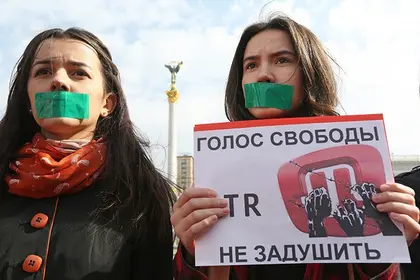On April 1, for ATR and other broadcasters, including children’s entertainment channel Lale and Meydan FM station, the midnight deadline expires for registration under the Russian law. If they didn’t get a green light from Russian telecommunications regulator until the end of the day, their work on the peninsula would be illegal.
While many of the publishers operating in Crimea got their registrations soon after they submitted their applications, for the number of Crimean Tatar media it was an unlucky streak.
JOIN US ON TELEGRAM
Follow our coverage of the war on the @Kyivpost_official.
The ATR submitted their documents three times in a row, but Russian authorities sent the papers back for corrections or additions. Even though the channel’s management used Moscow-based lawyers to prepare the documents, it gives no result.
So far, only one Crimean Tatar-language newspaper Yeni Dunya has successfully registered, Amnesty International reports.
The Mejlis of the Crimean Tatar People issued a statement on March 30, saying that the refusal for the re-registration of the independent Crimean Tatar media is a violation of the legal rights and interests of the Crimean Tatars.

Now the ATR employees have little hope that they would be able to keep broadcasting.
Lilya Budzhurova, deputy head for information policy at ATR channel, said they are stressed with the situation. She also adds that the problem is political, not a bureaucratic one.
“The Roskomnadzor (the regulator) it’s just a tool, but we all know that Crimean authorities often said that ATR is unwanted channel.”
Budzhurova says they don’t know what they would do after April 1, but if they fail to get the registration their work would be prosecuted by Russian authorities. She adds that there is a chance for them to move to Ukraine to continue their work.
Some other countries have already reached out to ATR managers, according to Budzhurova, offering them to continue their work in exile, but it is not an option for them.
“We’re a Crimean Tatar TV channel, we can’t work separated from our nation,” Budzhurova explains. “It’s impossible for us – neither technically – as we have to move some 200 employees then – nor morally.”
However, the management has no plans to give up. Budzhurova says they will file a lawsuit against Russian regulator, because they want to prove the ATR is not a “seditious” channel.
For the last couple of days, ATR started a telethon and a flash mob “Don’t kill ATR,” that took part in Crimea and a number of Ukrainian cities.
ATR – that used to broadcast in Crimean Tatar, Ukrainian and Russian – now places a running countdown clock in the corner of the screen ticking down the minutes until their license expires.
The channel, owned by businessman Lenur Islyamov, started its work in 2006. Some months ago, the management had to revise their programs – they cut political talk shows and news, instead focused on cultural programs.
Alim Aliev, a media consultant and co-founder of Crimea SOS center that helps refugees from the occupied Crimea, believes the shutdown of the channel would be a bad signal for the Crimean Tatars.
“This channel is a symbol of national renaissance for Crimean Tatars, their comeback to their homeland after the deportation,” Alimov explains.
For Crimean authorities, however, the work of the channel means something different. Crimean Prime Minister Sergei Aksionov, already hinted that those channels that “aggravate the situation and cause the population a sense of tension,” won’t continue broadcasting in Crimea as their work would be unwelcomed.
On March 21, Aksionov after the meeting with the channel’s top managers, said that ATR channel “gives a hope for the return of the Crimea in Ukraine – which is silly – and it will never happen.”
Kyiv Post staff writer Olena Goncharova can be reached at [email protected]
You can also highlight the text and press Ctrl + Enter




